Serving 297 students in grades Prekindergarten-8, Miles-exploratory Learning Center ranks in the bottom 50% of all schools in Arizona for overall test scores (math proficiency is bottom 50%, and reading proficiency is bottom 50%).
The percentage of students achieving proficiency in math is 15-19% (which is lower than the Arizona state average of 35%). The percentage of students achieving proficiency in reading/language arts is 25-29% (which is lower than the Arizona state average of 40%).
The student:teacher ratio of 9:1 is lower than the Arizona state level of 17:1.
Minority enrollment is 77% of the student body (majority Hispanic), which is higher than the Arizona state average of 66% (majority Hispanic).
Quick Stats (2025)
- Grades: Prekindergarten-8
- Enrollment: 297 students
- Student:Teacher Ratio: 9:1
- Minority Enrollment: 77%
- Overall Testing Rank: Bottom 50% in AZ
- Math Proficiency: 15-19% (Btm 50%)
- Reading Proficiency: 25-29% (Btm 50%)
- Science Proficiency: 10-14% (Btm 50%)
- Source: National Center for Education Statistics (NCES), AZ Dept. of Education
Top Rankings
Miles-exploratory Learning Center ranks among the top 20% of public schools in Arizona for:
Category
Attribute
Student Attention
School Overview
Miles-exploratory Learning Center's student population of 297 students has declined by 14% over five school years.
The teacher population of 32 teachers has grown by 33% over five school years.
Grades Offered
Grades Prekindergarten-8
Total Students
297 students
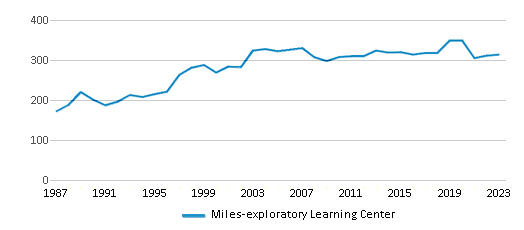
Gender %
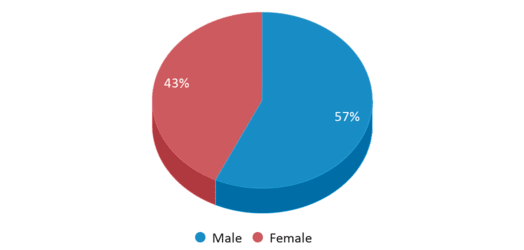
Total Classroom Teachers
32 teachers
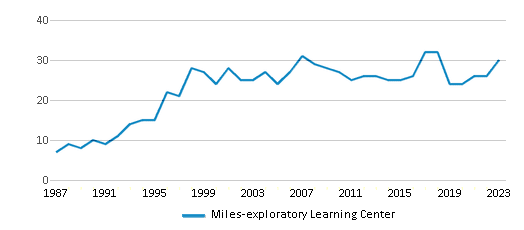
Students by Grade
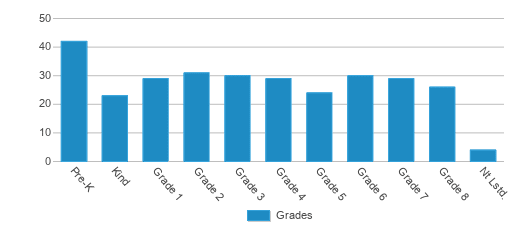
School Calendar
School Rankings
Miles-exploratory Learning Center ranks within the bottom 50% of all 1,956 schools in Arizona (based off of combined math and reading proficiency testing data).
The diversity score of Miles-exploratory Learning Center is 0.55, which is less than the diversity score at state average of 0.66. The school's diversity has stayed relatively flat over five school years.
Overall Testing Rank
#1348 out of 1956 schools
(Bottom 50%)
(Bottom 50%)
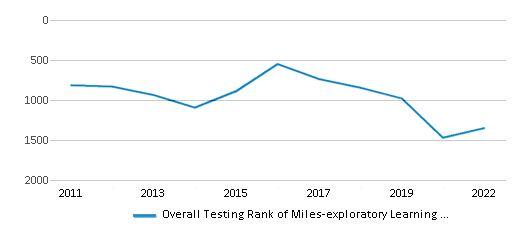
Math Test Scores (% Proficient)
15-19%
35%
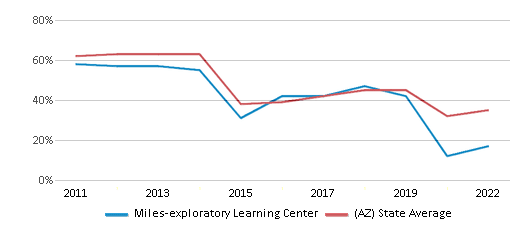
Reading/Language Arts Test Scores (% Proficient)
25-29%
40%
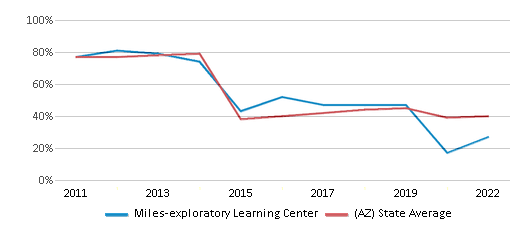
Science Test Scores (% Proficient)
10-14%
24%
Student : Teacher Ratio
9:1
17:1
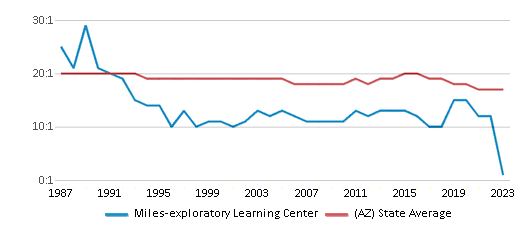
American Indian
2%
5%
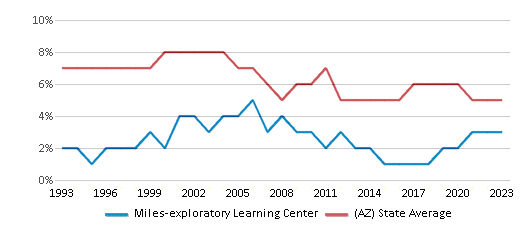
Asian
3%
3%
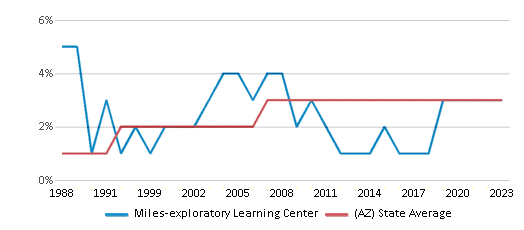
Hispanic
63%
48%
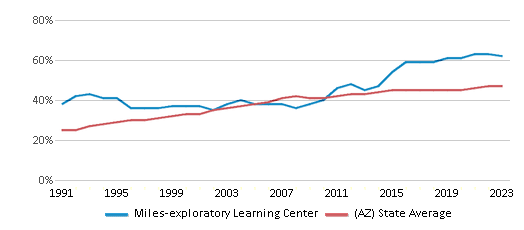
Black
4%
6%
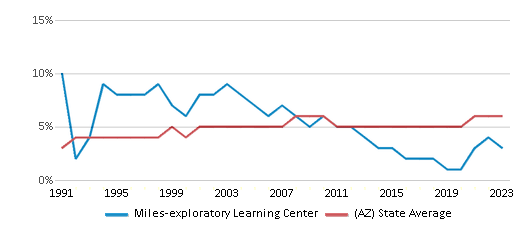
White
23%
34%
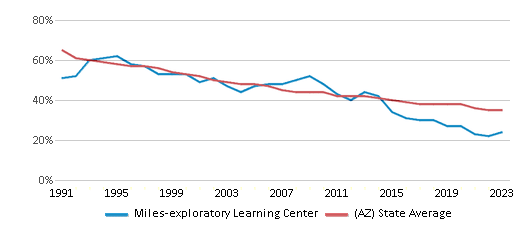
Hawaiian
n/a
n/a
Two or more races
5%
4%
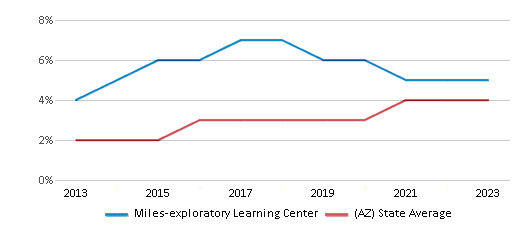
All Ethnic Groups
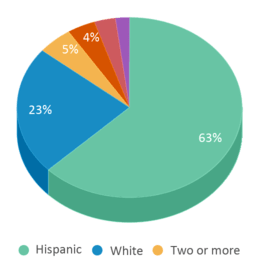
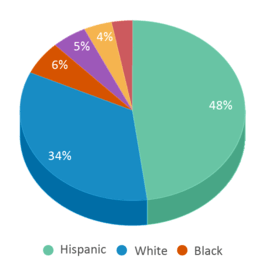
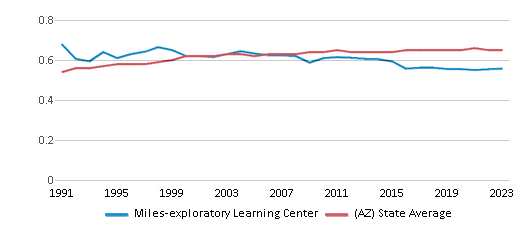
Eligible for Free Lunch
32%
40%
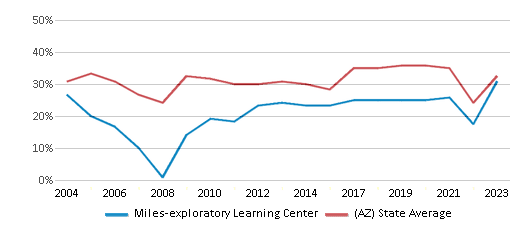
Eligible for Reduced Lunch
3%
10%
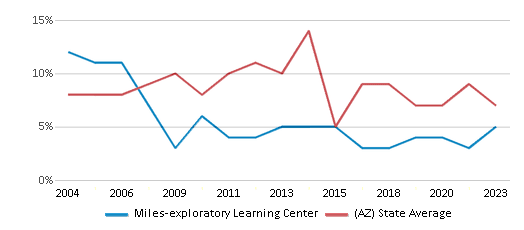
School Statewide Testing
School District Name
Source: National Center for Education Statistics (NCES), AZ Dept. of Education
Profile last updated: 02/09/2025
Frequently Asked Questions
What is Miles-exploratory Learning Center's ranking?
Miles-exploratory Learning Center is ranked #1348 out of 1,956 schools, which ranks it among the bottom 50% of public schools in Arizona.
What schools are Miles-exploratory Learning Center often compared to?
Miles-exploratory Learning Centeris often viewed alongside schools like Sam Hughes Elementary School by visitors of our site.
What percent of students have achieved state testing proficiency in math and reading?
15-19% of students have achieved math proficiency (compared to the 35% AZ state average), while 25-29% of students have achieved reading proficiency (compared to the 40% AZ state average).
How many students attend Miles-exploratory Learning Center?
297 students attend Miles-exploratory Learning Center.
What is the racial composition of the student body?
63% of Miles-exploratory Learning Center students are Hispanic, 23% of students are White, 5% of students are Two or more races, 4% of students are Black, 3% of students are Asian, and 2% of students are American Indian.
What is the student:teacher ratio of Miles-exploratory Learning Center?
Miles-exploratory Learning Center has a student ration of 9:1, which is lower than the Arizona state average of 17:1.
What grades does Miles-exploratory Learning Center offer ?
Miles-exploratory Learning Center offers enrollment in grades Prekindergarten-8
What school district is Miles-exploratory Learning Center part of?
Miles-exploratory Learning Center is part of Tucson Unified District (4403) School District.
In what neighborhood is Miles-exploratory Learning Center located?
Miles-exploratory Learning Center is located in the Miles neighborhood of Tucson, AZ.
School Reviews
1 3/24/2021
Sadly, this school put my child with special needs in danger and then abandoned her. The problem at Miles wasn't the teachers, the problem is poor resources and ineffective and inflexible administration. The district will try to get out of paying anything they can for students with special needs. They had the data from the school showing she clearly needed aide support but they still would not provide it due to the cost. My 5-year-old got away from her teacher who was in charge of a whole class and ran into a busy street. Then when school went to online only in March 2020 and my child could not learn that way, admin just gave up on her. They would not bring her in for tutoring or any services, even though her special ed teacher recognized that she could not learn online and wanted to teach her in person, admin refused. The school has remained shuttered for an entire year now. I feel terribly for any students stuck in TUSD who needed in person education and have lost out on so much.
Review Miles-exploratory Learning Center. Reviews should be a few sentences in length. Please include any comments on:
- Quality of academic programs, teachers, and facilities
- Availability of music, art, sports and other extracurricular activities
Recent Articles

What Is A Charter School?
Explore the world of charter schools in this comprehensive guide. Learn about their history, how they operate, and the pros and cons of this educational innovation. Discover key facts about charter schools, including admission policies, demographics, and funding, as well as what to look for when considering a charter school for your child.

10 Reasons Why High School Sports Benefit Students
Discover the 10 compelling reasons why high school sports are beneficial for students. This comprehensive article explores how athletics enhance academic performance, foster personal growth, and develop crucial life skills. From improved fitness and time management to leadership development and community representation, learn why participating in high school sports can be a game-changer for students' overall success and well-being.

February 05, 2025
Understanding the U.S. Department of Education: Structure, Impact, and EvolutionWe explore how the Department of Education shapes American education, from its cabinet-level leadership to its impact on millions of students, written for general audiences seeking clarity on this vital institution.







